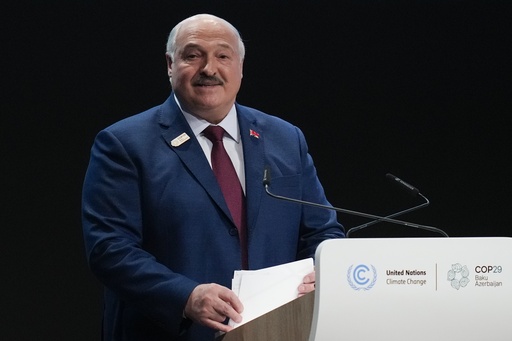
TALLINN, Estonia — In a significant escalation, Belarusian authorities have detained more than 100 relatives of political prisoners as part of a new crackdown ahead of the January elections where President Alexander Lukashenko aims to secure his seventh term, according to reports from rights activists.
The Viasna human rights organization indicated that the arrests commenced on Thursday, focusing on the families and friends of those imprisoned for political reasons in various cities throughout the nation. This move seems to be aimed at dismantling any remaining opposition to Lukashenko, who has maintained his rule for over three decades.
Sviatlana Tsikhanouskaya, the exiled leader of the opposition, criticized the recent wave of arrests as a severe blow to unity among Belarusians just ahead of what she termed a “pseudo-election.” She expressed concern that the regime is attempting to fracture solidarity and intimidate the families of those who are incarcerated.
Andrej Stryzhak, leading the BySol organization, which provides aid to political prisoners and assists dissidents in fleeing the country, noted that his group is actively working to help individuals escape if they are at risk of being detained.
“The authorities are making efforts to dismantle a network of solidarity that has formed in Belarus amid four years of intense repression,” Stryzhak commented. “Our evacuation service is operating at full capacity, and requests for assistance are flooding in.”
The severe backlash by the Belarusian government followed the massive protests stemming from the 2020 election, widely deemed fraudulent, which allowed Lukashenko to extend his presidency for a sixth time. This resulted in the arrest of nearly 65,000 individuals. Many key opposition leaders faced imprisonment or chose to leave the country. Human rights groups report that Belarus currently holds around 1,300 political prisoners, many of whom lack access to necessary medical treatment and family contact.
As the January 26 election approaches, the authorities have escalated their repression efforts, with recent detentions reportedly targeting individuals involved in online communications established by residents in various cities.
In contrast, Lukashenko has recently pardoned 146 political prisoners since July, a gesture interpreted by some observers as an attempt to demonstrate openness to dialogue with the U.S. and the European Union, both of which imposed extensive sanctions following his government’s suppression of dissent. The freed individuals were those who cited health issues, requested pardons, and expressed remorse.
Recently, authorities also permitted prominent imprisoned activist Maria Kolesnikova to see her father after being cut off from contact with relatives and friends for over 20 months. Stryzhak remarked, “The government is conducting a public relations effort to fabricate an appearance of a ‘thaw,’ which raises the stakes for those politically engaged in Belarus.”
